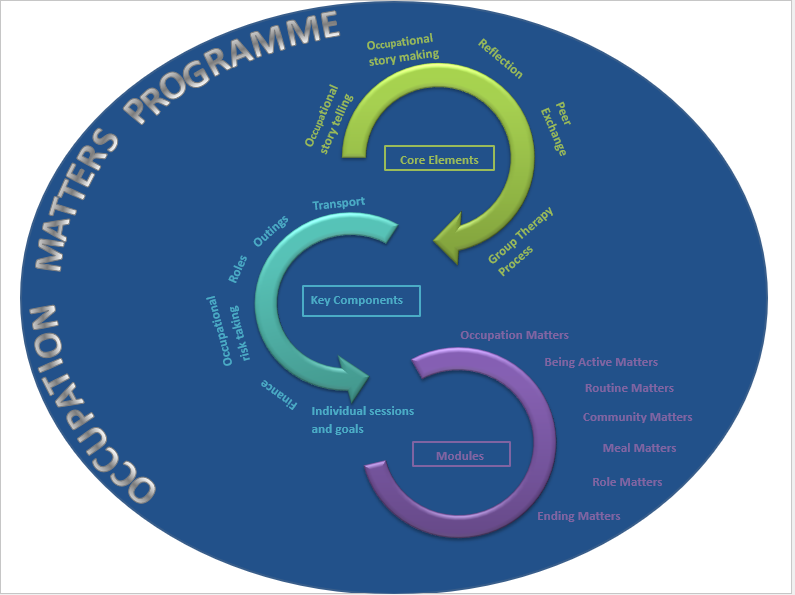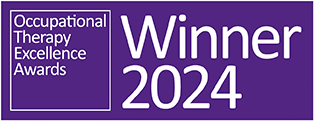The Occupation Matters Programme was developed by the occupational therapy service at Surrey and Borders Partnership NHS Foundation Trust in 2011.
This programme is designed to support people with severe and enduring mental health challenges to redesign their lifestyles, develop healthy activities, pursue meaningful occupations, and build a life worth living.
How the programme works
Delivered through our Community Mental Health Recovery Services, the programme is facilitated by two occupational therapists. It is inspired by Lifestyle Redesign® and supported by evidence from two key studies:
• Well-Elderly Study Occupational Therapy Programme (1998)
• Effectiveness of a Lifestyle Intervention in Promoting Well-being of Independently Living Older People (2011)
The programme runs over six months and includes 20 group sessions and five individual sessions, structured around modules that can be tailored to meet each participant’s needs.
Programme Modules
There are two core modules that everyone completes:
• Occupation Matters
• Endings Matter
Participants also select three from the following five optional modules:
• Being Active Matters
• Routine Matters
• Community Matters
• Meals Matter
• Roles Matter
Each module includes activities that support personal goals and concludes with an outing. These outings offer participants the chance to practise new skills and support meaningful lifestyle changes.
A collaborative, empowering approach
Our occupational therapists guide the therapeutic process while also participating as group members. Key elements woven into the programme include:
• Building confidence in using public transport
• Encouraging occupational risk-taking
• Managing finances
• Goal setting
The programme also encourages peer support, personal reflection, and occupational storytelling. Participants are encouraged to take ownership by choosing modules, setting goals, and planning outings.
This sense of responsibility and ownership has been shown to strengthen engagement, promote connection, and support participants in making significant lifestyle changes.

Measuring Progress
Each participant develops individual goals and practises skills within the group setting to support their achievement. Progress is measured using recognised tools:
• Personal Goals
• Model of Human Occupation Screening Tool (MOHOST)
• Occupational Self-Assessment (OSA)
• CORE Measurement Tool
Key outcomes
Model of Human Occupation Screening Tool
- 67% of participants improved expectations for success
- 64% of participants improved appraisal of ability and choices
- 63% of participants demonstrated improvements in routine, responsibilities, relationships and social groups.
Occupational Self-Assessment
- Most significant improvements were working towards goals, having a role, having a satisfying routine, accomplishing what I set out to do and effectively using my abilities.
CORE Measurement Tool
- A paired-samples t-test showed a significant change in score from the start to the end of the group.
Participant Achievements
Participants have experienced a range of benefits from the programme, including:
- A stronger sense of belonging
- Increased community engagement
- Reconnection with past interests and discovery of new meaningful roles
- Improved social skills and development of meaningful relationships
- Establishing an identity beyond their mental health condition
- Enhanced goal-setting and problem-solving abilities
- Increased motivation
In their words,
“and I did it (going on a bus), and I did it on the way back as well, we achieved something. We did all achieve it. … Um, like a … collective victory!”
“It is important to accomplish something… there’s always some reason we’re in this world… I’m a photographer, I’m a graphic designer, I go out for a photo shoot... the programme has given me reason to go out.”
“ I guess, when you’ve isolated yourself for a while and have mental difficulties, knowing that you actually can still be accepted by the group and have confirmation of that… There’s some form of deeper connection.”
Research Outcome
A study using interpretative phenomenological analysis found that the programme was influential in participants’ recovery. It supported a more authentic sense of self, improved mood, and well-being. Participants described reconnecting with others and developing a healthier self-image, seeing themselves as whole people rather than defined by their mental health condition.
“We were just getting more like human beings again, rather than just ghosts or not-there people.”
“Maybe I’m not that abnormal.”
Reference: Newport, A., & Clarke, C. (2020). The experiences of people with severe mental health conditions participating in the Occupation Matters Programme: An interpretative phenomenological analysis. BJOT, 83(10).
The impact on Occupational Therapists
The programme has strengthened the role of occupational therapists within our Community Mental Health Recovery Services, helping develop a professional identity and providing a clear intervention pathway.
“It has been great not only for our sense of work satisfaction but also for developing our OT pathway.”
“Facilitating the group enables participants to talk freely about their occupational experiences and challenges. Friendships have been made, sustained, differences embraced, and inclusion experienced.”
National Developments
We are committed to expanding access to this innovative programme to support more people with severe and enduring mental health difficulties.
The programme and an accompanying training package are available for other mental health trusts interested in implementing it within their services. Outcome measures from these initiatives continue to strengthen the evidence base for the programme’s effectiveness.
For more information, please contact:
- Louise Wiggins (Associate Director of Therapies for Hospital and Specialist Services) - louise.wiggins@sabp.nhs.uk
- Alison Newport (Leadership Development Lead) - alison.newport@sabp.nhs.uk
